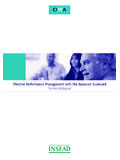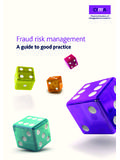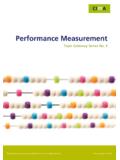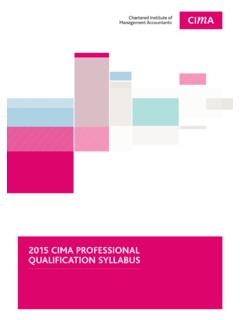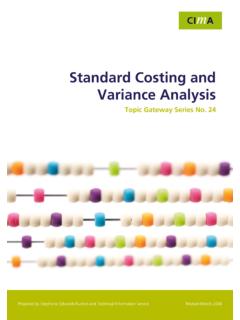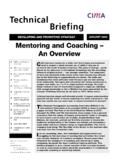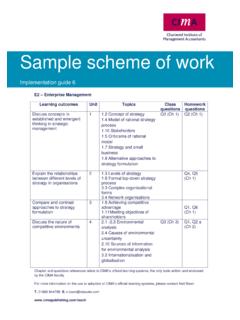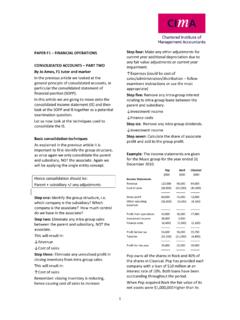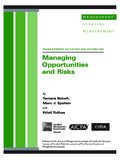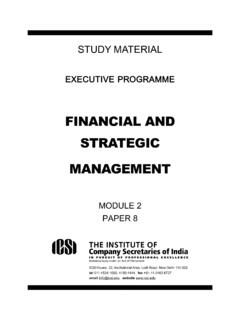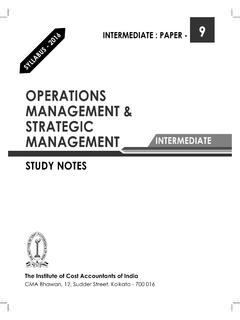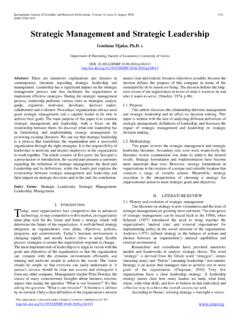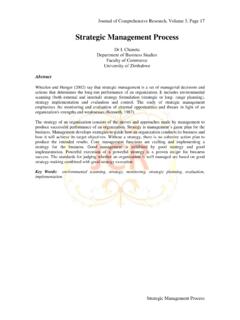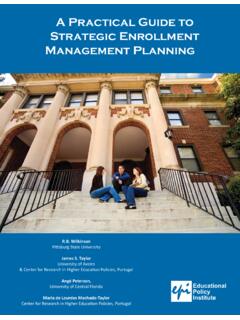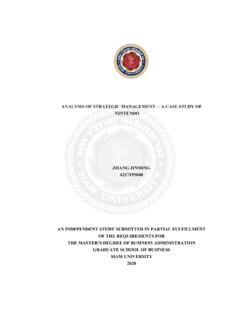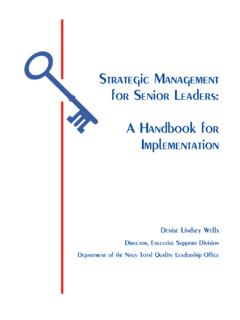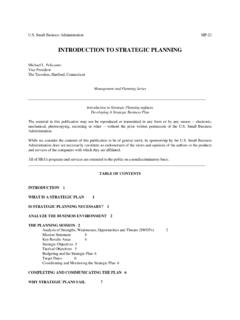Transcription of ManageMent accounting in Support of the Strategic …
1 Chartered Institute ofManagement AccountantsChartered Institute ofManagement Accountants CIMA Executive Summary ReportVolume 11 Issue 1 ManageMent accounting in Support of the Strategic ManageMent proceSSManageMent accounting in Support of the Strategic ManageMent process for More inforMation viSit 2 accountants involvement in the Strategic ManageMent process depends on: organisational position, the culture of the organisation, relationship with ceo, and credibility abilities of the accountant both technical and interpersonal and, importantly, desire to contribute to strategy development resources available. routine monthly reporting may squeeze out longer term Strategic activity. the term Strategic ManageMent accounting was not looked upon favourably by participants who preferred the term business partnering to describe their activities in supporting the Strategic ManageMent process .
2 Many of the techniques often packaged as Strategic ManageMent accounting are little used. Key techniques that are used in strategy formulation include benchmarking, customer profitability analysis (at contribution margin level) and investment appraisal. Sophisticated costing techniques are little used. there is little evidence of an external focus as suggested by the ciMa definition of Strategic ManageMent accounting , although there is tracking of competitor position and pricing but no evidence of deeper competitor analysis. ManageMent accounting aids Strategic decision making via the provision of financial analysis, but the focus is on providing some assurance that the Strategic decision has the potential to be viable, with Strategic factors often given more weight. participants stressed monitoring of margins, re-forecasting and variance analysis as key activities during implementation and valuable inputs to future strategy development, often via signalling the need for Strategic action.
3 Key ConClusionsAbstrACtit was during the 1980s that writers began to criticise ManageMent accounting for not adequately serving the needs of senior managers in the formulation of strategy and sustaining a competitive advantage. at the same time a body of literature emerged around the development of Strategic ManageMent accounting (SMa) which promised to answer the criticism. however, to date there has been no agreement on what constitutes SMa. neither has the term entered the lexicon of accounting findings of this study, based on 14 interviews with finance professionals working in business, indicate that despite not using the term SMa, accountants can, and do, make an active contribution to the Strategic ManageMent process . the range of techniques utilised may not be as extensive as previous studies into SMa have suggested.
4 Also the degree to which accountants are able to become involved is influenced by organisational factors, the range of attributes possessed by the accountant, and the practicalities involved in enabling the accountant to perform his/her role. the closest term that defines the role of accountants when involved in the Strategic ManageMent process is that of business partnering .This paper reports on the findings of a CIMA-sponsored study into the extent to which ManageMent accounting supports the Strategic ManageMent 02 introduction 02 objectiveS 03 reSearch Methodology 04 reSearch Method 04 theoretical fraMeworK 06 diScuSSion and findingS 12 concluSionS 13 recoMMendationSpBManageMent accounting in Support of the Strategic ManageMent process for More inforMation viSit 2introduCtionobjeCtivesIn the 1980s ManageMent accounting was criticised for becoming too internally focused on operational issues and was providing little help to managers making Strategic decisions.
5 The term Strategic ManageMent accounting (SMA) was introduced by Simmonds (1981, ) and defined by him as the provision and analysis of ManageMent accounting data about a business and its competitors, for use in developing and monitoring business strategy . Since then several attempts have been made to refine this definition and identify a set of techniques that can be classified under the banner of SMA. However there has been little agreement within the academic and professional literature on the definition of SMA and the associated techniques, nor is the term widely used by practising accountants (Langfield-Smith, 2008; Jorgensen and Messner; 2010; Nixon et al., 2011).The project seeks to investigate and enhance understanding of:1. the extent to which ManageMent accounting is utilised to Support Strategic decision making and the Strategic ManageMent process within organisations.
6 2. the most common aspects of Strategic decision making where ManageMent accounting is seen to make a significant the ManageMent accounting tools that are utilised in a Strategic the extent to which it is possible to define the concept of Strategic ManageMent accounting within a wider definition of ManageMent accounting . ManageMent accounting in Support of the Strategic ManageMent process for More inforMation viSit 3reseArCh methodologyThe methodology adopted is one of narrative research (Czarniawska, 1998; Riessman, 2008). This allows the interviewees to tell their own stories (narratives) based on personal experience. the data was then analysed utilising a method of thematic analysis developed by creswell (2007) from the earlier work of Moustakas (1994) in which data is first analysed into meaning units which can then be grouped into themes.
7 Nvivo 10 software was used to aid this process . the business-oriented social networking service, linkedin, was used to send a total of 68 invitations to participate in the study to senior finance professionals. the initial target was to recruit 12 participants representing a range of industry sectors. however 14 potential participants responded positively which represented a range of sectors and size of organisation and all 14 were interviewed. of the 14 participants nine are finance directors or finance director designates and five are consultants/interim finance directors (see table 1 interview schedule). the discussion with the finance directors and finance director designates focused around their current appointment but in the spirit of narrative research discussions included experiences from previous employments.
8 The consultants/interim finance directors were invited to discuss not just their current appointment but to draw on their wider experience of organisations within which they had worked. the organisations discussed as part of the consultants/interim finance directors interviews covered a range of sectors which included: logistics; property investment; fMcg manufacturing; weapons manufacturing; private equity banks; industrial conglomerate; high street retailing; service provision; horticulture; waste ManageMent ; pharmaceuticals; and 1 interview sCheduleinterviewdeScription of buSineSSturnover1private healthcare diagnostics 1m2consultant/interim finance directorn/a3an organisation specialising in vibration measurement which delivers technological solutions and products 37m4consultant/interim finance director focusing on small and medium-sized enterprises(SMes)n/a5a not-for-profit professional society and publisher 47m6consultant/interim finance directorn/a7provider of fertility treatment, genetic diagnosis and screening techniques 20m8an international fragrance house$100m (uSd)
9 9consultant/interim finance directorn/a10a professional services organisation 12m11an innovator of enterprise location intelligence products and solutions 27m12consultant/interim finance director specialising in turnaround servicesn/a13a pan-european technical solutions provider, combining electrical, ict and mechanical services 650m (uK t/o)14a private education provider 120mManageMent accounting in Support of the Strategic ManageMent process for More inforMation viSit 4reseArCh methodtheoretiCAl frAmeworKInterviews were face-to-face except for one, which was a telephone interview. The Strategic ManageMent process constitutes the theoretical framework for the study together with the concept of Strategic ManageMent accounting and the role of the accountant. the meetings lasted between 45 minutes to one hour which included informal discussion prior to and following the formal interview.
10 The formal interviews lasted on average 40 minutes and were recorded and transcribed. prompts were utilised to ensure the data collected covered the objectives of the research but discussions were allowed to flow as freely as possible. during the interviews participants were invited to discuss the ManageMent accounting information that was utilised within the organisation and the purposes for which it was used and in particular to narrate instances of Strategic decisions and strategy development. the term Strategic ManageMent accounting was also discussed along with the Strategic ManageMent process and participants experience of the role that accountants play within that process . the Strategic ManageMent process has been described in a variety of ways but there is broad consensus that the key activities are (1) development of a grand strategy, purpose or sense of direction, (2) formulation of Strategic goals and plans to achieve them, (3) implementation of plans, and (4) monitoring, evaluation and corrective action (nixon and burns, 2012, ).
